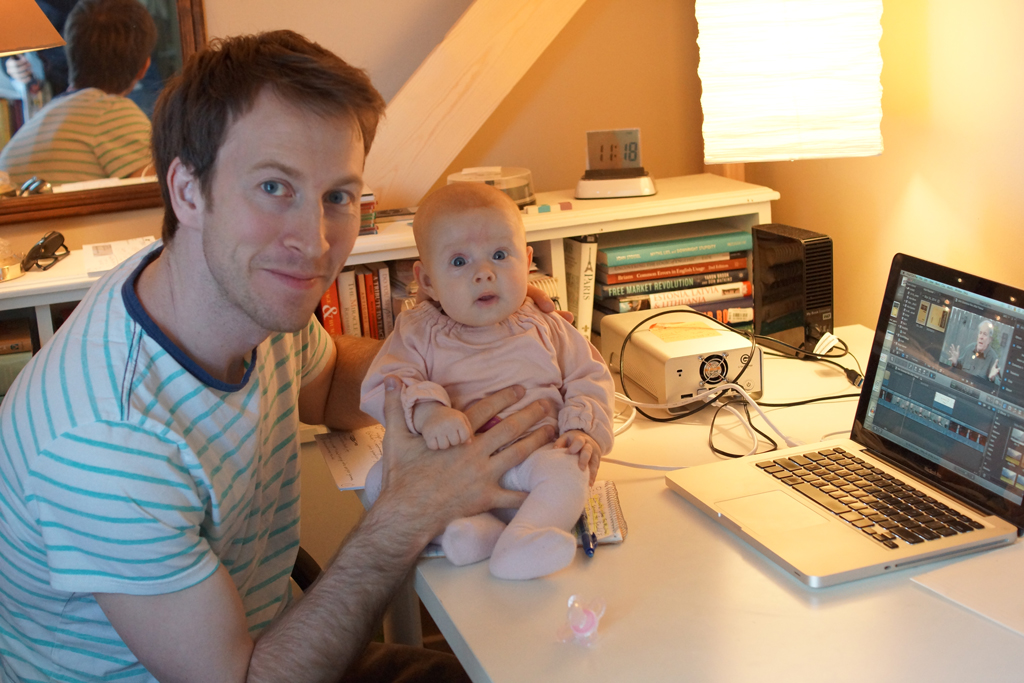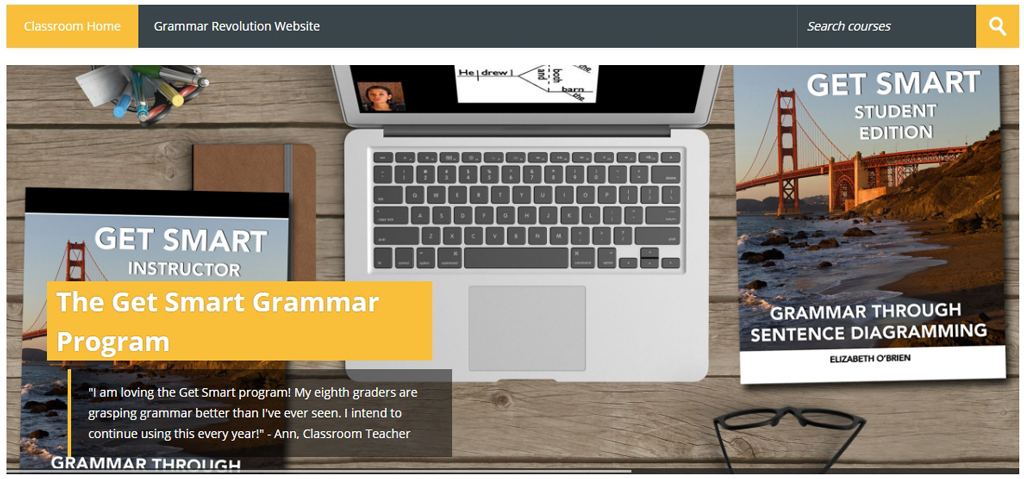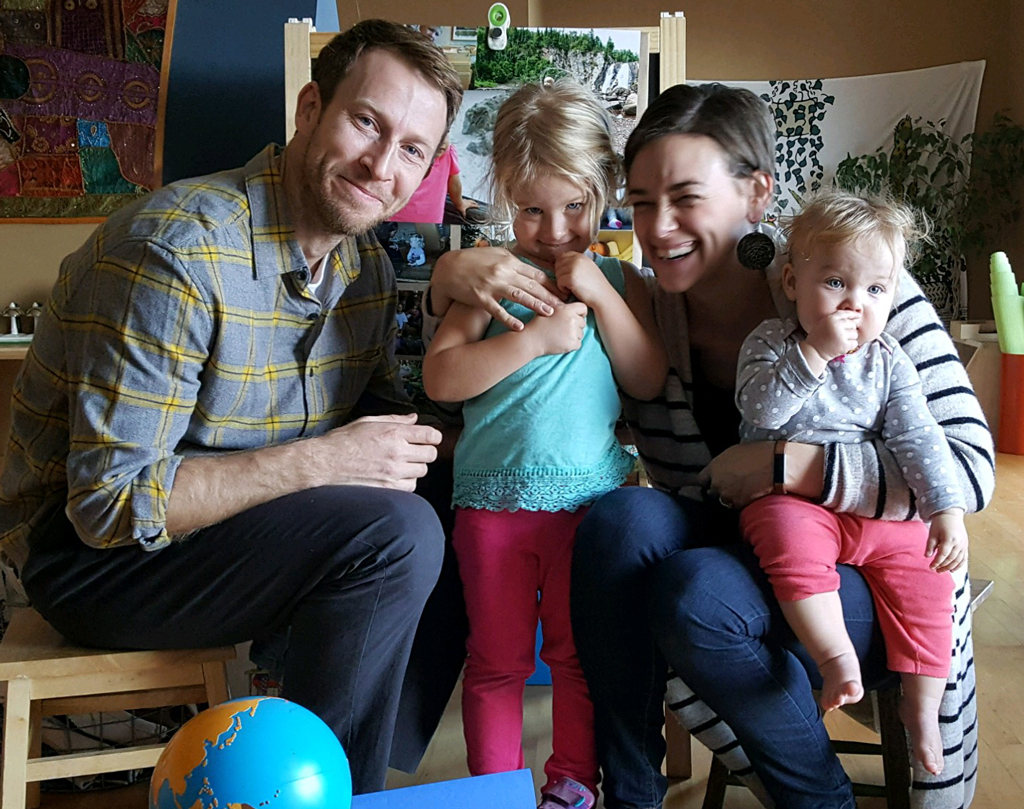
My husband and I were able to be full-time parents for the birth of our two daughters. It’s been amazing to focus on my children with my husband by my side rather than having one or both of us out of the house working.Elizabeth O’Brien from english-grammar-revolution.com
Elizabeth O’Brien used to hate grammar. Throughout her school years, and even in college she thought she wasn’t smart enough to “get it.”
So, one day she decided to make a change. She took a grammar class at her university, determined to do anything to understand grammar. Luckily, she had an excellent professor who taught grammar in a logical, structured way.
Finally, Elizabeth “got it.” Eureka! Not only did she understand grammar now, but she enjoyed it so much that she decided to teach others. She wanted to help people teach and learn grammar in an approachable, interesting, fun, visual way.
Teaching grammar in a fun way? Is that even possible? It is, as you’ll see in our interview with Elizabeth. You’ll be amazed what else is possible with a love for teaching grammar rules. A fully funded a work at home lifestyle for example, with enough income to support a family of four.
Excited to hear more? Here you go…
1. Elizabeth, you started www.english-grammar-revolution.com because you used to hate grammar. Can you explain that puzzling development?
I never understood grammar growing up, and I began to think of my difficulty with the subject as some sort of mysterious intellectual shortcoming. It wasn’t until I was taking a grammar class in college that I grasped my problem: I was never actually taught grammar. My IQ had nothing to do with it!
Once I had been taught, I realized how easy – and even interesting – learning grammar could be. Over the course of a semester, I managed to master the bulk of grammar and get rid of my self-limiting beliefs about it. How silly that I had spent years feeling bad about something that took a few weeks to learn!
After spending a few years teaching grammar with a fresh love of the subject, I wanted to have a wider impact. I was upset that this material wasn’t being covered in most classrooms, and I wanted to offer support to people who wanted to learn it.
Everything that has ever happened to you, good or bad, is a possible seed for a business – especially the bad.
Take Susan Gast, for example. After she and her family had been without power for weeks during an especially bad hurricane season in 2004, she became obsessed with having enough food prepared in a manner that it would not go to waste. She learned all she could about food dehydrating. And – you guessed it – she had found her perfect business niche.
What expertise or skills have you acquired, either on your job or by tackling a personal problem? It doesn’t have to be big or important or sexy to turn into a great business.
Even a topic as seemingly dry as English grammar can be the basis for a fabulously profitable and rewarding work at home business, as we shall hear from Elizabeth.
2. How did you know that teaching English grammar online had great business potential?
I started my online business journey without a definite idea of what I wanted to do. I had a few interests, but I didn’t know the first thing about assessing which of them had the best business potential.
An acquaintance of mine was building an online business with SBI! able to work at home and was making $6,000 a month. That was more than I had been making working at my 9+ hours a day teaching job!
I signed up with SBI!, and I went through all of the steps just as they are outlined in the Action Guide. Using SBI!’s tools, I was able to see that the supply and demand for “English grammar” was a good fit for me, and I dove right in!
- Find a hosting company, register your domain and start writing.
or
- Research your ideas’ business potential, carefully plan how you could differentiate yourself from the competition, evaluate your monetization options and then register your domain and start writing.
If you answered B, congrats! You just multiplied your chances for success. Unfortunately, far too many solopreneurs still follow path A. They are so enthusiastic about their idea that they jump right in without having a plan.
The initial research and planning phase might not be very exciting, but it is crucial for your business success. Elizabeth did it the right way. She followed the steps outlined in the SBI! Action Guide to evaluate her business idea(s).
When she talks about “supply and demand,” she refers to keyword brainstorming as part of her research. Brainstorm It!, the tool that comes with every SBI! subscription, brings back hundreds of search terms (aka keywords) related to your “seed word” or topic. (In Elizabeth’s case, her “seed word” was “English grammar.”)
It tells you how often each term is searched for (“demand”), and how strong the competition is (“supply”). With smart filter and analysis functions, Brainstorm It! helps you assess whether your niche is too small, too big or just right.

3. Tell us about your philosophy regarding content. How do you know what your prospective customers are looking for? Where does this information come from?
When I was starting the site, I only wrote pages/articles centering on keywords that had good supply and demand numbers. (I found those through the SBI! tools, without which I would have been operating in the dark.)
I would find a good keyword within the grammar niche, learn all I could about that topic, and then write about it. It kind of felt like a treasure hunt, and I loved it.
And now, years later, I have a constant stream of organic search traffic coming to my site without paying for any of it. “Free traffic is your lifeblood” is something I learned from SBI!, and I totally agree.
You know which topics are in demand, and what search terms (or keywords) people use to find information related to these topics. Based on your niche knowledge and additional research, you then create the best possible content around these keywords. Your content gets found in the search engines and attracts just the right audience.
Your traffic starts to build. Of course, this doesn’t happen overnight. Creating great content that is of real value to your readers takes time and effort. But your reward is free organic traffic from the search engines for years to come. And – as Elizabeth pointed out – this traffic is the lifeblood for your business.
No matter how you monetize, whether passively with Google AdSense for example, or actively by selling your own products or services, you first need people to visit your site.
Talking about monetization, let’s see how Elizabeth earns an income from her traffic and which tips she has in store for you.
4. In your shop, you offer grammar teaching materials in various formats (eBooks, printed books, posters, videos). Can you share some best practices about creating such a variety of products?
We all have this tendency to create a product that we think is important, without talking to our perspective customers first. We will spend hours creating a product that we don’t actually know anyone wants, and then we expect people to buy it once we release it. You can really get burned that way.
Before you pour hours of your life into creating something, interact with your customers so that you know the thing you want to make aligns with what your customers want to buy. (This is one reason that you need to begin collecting email addresses as soon as possible. SBI! makes that really easy.)
Whenever possible, create products only after polling people and having a test group actually buy your product idea with real money. Have this group go through the product as you create it.
This does a few important things:
- it allows you to know you have a viable product before you’ve invested hundreds of hours creating it
- it allows you to steer the creation process in a direction that best fits your customers (because you get instant feedback from them) and
- it keeps you accountable for creating and releasing the thing.
Our most popular product is our “Get Smart Grammar Course.” I started that course after polling my audience about it and having paid customers waiting for new lessons every week. Knowing that people had paid me and were waiting to receive their content pushed me to create when I maybe would have otherwise sat around binge-watching Netflix.
This technique will also help you get over perfection-paralysis, something many of us face. I had deadlines that I had to meet because people were expecting their lessons. I have since built on those initial written lessons over the years, and the “Get Smart Grammar Program” now includes video lessons, more practice, and fewer typos.
If I had held myself to the standard of perfection from the start, I probably still wouldn’t be done with the darn thing!
(For step-by-step information about polling your audience before you make a product, listen to this podcast published by Smart Passive Income.)
- Don’t create products that you think your audience needs or wants. Instead, ask them and listen to their feedback. We call this the solopreneur’s “number 1 lifeline to success.” The best way to ask? Via your newsletter. See the next point.
- Build your subscriber list from the start. SBI! gives you all the tools you need to create opt-in forms and to send out a newsletter.
- Start with a so-called “minimum viable product.” Give a select group of people early access to this test version in exchange for their feedback. Refine and improve the product over time.
- Set yourself deadlines that you cannot ignore. If your product is a an online course (written, audio or video), publish the first couple of lessons before the whole course is finished. If your product is an ebook, send out teasers to your subscribers where you announce the publication date.

5. How long did it take to earn an income from www.english-grammar-revolution.com? Is it a part-time or a full-time income?
I make what I would describe as a full-time income for my family, but it’s not dependent on my working full-time. I can engage with work at home when I want to engage and step back when I need to step back without my income being affected much.
I’ve taken multiple months-long hiatuses where I’m doing the bare minimum so that I could focus on my family, traveling, or other personal obligations. (The bare minimum for my business is fulfilling orders, answering emails, and sending out my newsletter.)
My husband and I were able to be full-time parents for the birth of our two daughters. It’s been amazing to focus on my children with my husband by my side rather than having one or both of us out of the house working.
Here’s a breakdown of my income for the first six years along with a few short notes of what I was up to each year:
2009 – I started the site, and I excitedly worked night and day on it. (We had no children at the time, so this sounds like such a luxury now!) I didn’t see much return yet. Both my husband and I substitute taught during this time to make ends meet. The site grossed $1,400.
2010 – I started offering ebooks and grossed $14,000 this year. Exciting!
2011 – I continued offering ebooks, and I started making more in-depth courses. This year, the site grossed $25,000.
2012 – My husband and I ran a successful Kickstarter campaign for a documentary on grammar education. We traveled around the country filming for the documentary. (We met with and interviewed some prominent linguists and grammarians, including Steven Pinker and Noam Chomsky. We had fun!) I continued offering products and creating content. The site grossed $42,000.
2013 – I had my first daughter at the end of this year, so I took some time off. The business gained momentum. The site grossed $83,000.
2014 – This is the year we crossed the six-figure mark. Yay!
2015 – Present – The business is going strong. I continue learning more about business and my customers so that I can continue serving them in the best way possible.
Sure, there are also enough jobs where you can earn a 6-figure income. But which traditional job gives you the freedom to step back and take months-long breaks without cutting back your income (or losing your job altogether)?
Add to it the sense of achievement that you’ve created something of value out of nothing… and you’ll probably agree that owning a profitable online business is the best thing since sliced bread. 😉
Eager to get started yourself? We are here to help. Learn more about SBI! here or talk to one of our Advisors how SBI! can work for you.
6. Your videos about a rather dry topic like grammar are engaging and fun. What’s your “secret”? And how important is video as a medium for your business?
Videos are so important these days. Most of us would prefer to hit play and have someone explain things instead of reading about it on our own.
Videos can be a mental challenge to produce, though. My two “secrets” (if you can call them that) are to set aside my inner critic and to talk to the camera as though I were talking to a friend.
Most of us are very critical of ourselves when standing in front of a camera. It’s such an intimidating experience! We get nervous and we focus on all of the things we’re doing wrong. I try to set that aside and focus on sharing something valuable with people. I imagine that I’m sharing my thoughts with friends, and that helps.
And I also try to pick topics that I’m excited about at the time. Believe it or not, I can get excited about diagramming sentences and proper punctuation. 😊
Can you believe that the average person watches more than an hour and a half of online video content per day, with around 15% averaging more than three hours per day? (Source: Wyzowl, Video Marketing Statistics 2018)
If you have yet to dive into creating videos, take Elizabeth’s advice to heart: imagine talking to a good friend and tell your inner critic to “get lost.”
For some inspiration, check out how Elizabeth explains “adjective clauses” in the video below. Clearly, she does have fun explaining that grammar rule!
7. You have a strong Facebook presence with over 220,000 fans. How did you build such a large and engaged community on Facebook?
I’m honestly not exactly sure! I have a tiny obsession with Photoshop, so I’ve always liked making graphics that capture the idea of my lessons, and I think that helped.
The first thing you’ll notice is a professionally done header image, with a background relevant to her topic and three customer testimonials. Her profile picture adds to a great first impression.
As her “pinned post” (i.e. the first post below the header), she offers a free ebook. Neat idea! Her visitors get a free gift, and Elizabeth gets subscribers to her newsletter.
When you scroll down her Page, you’ll see a good mix of her own content (videos and graphics), other people’s content (links to useful articles) and some fun stuff that makes you laugh and is still relevant to her overall topic.
You’ll further notice that she replies to every question and acknowledges people’s comments.
Elizabeth follows two ground rules for building a great Facebook presence: firstly, she posts highly useful, visually appealing and often entertaining content. Secondly, she engages with her audience.
But there’s one rule that she doesn’t follow closely: her posting schedule isn’t very consistent. She might post two days in a row, or make one post per week, or have rather long breaks without posting at all. It seems that once you have an audience that loves you, the posting frequency doesn’t matter so much anymore.
A beautiful example of the graphics that Elizabeth shares on her Facebook Page. It’s the equivalent to the “adjective clause” video we shared above.
8. What has been your biggest challenge so far as a solopreneur?
For me, the challenges change depending on what season of life I’m in and where my business is at the time.
I think my biggest challenge is balancing the big picture view with the details and knowing that I’m steering the ship in the direction I want to be moving. It’s easy to get caught up in minutiae and forget what you really want.
While this can be invigorating and inspiring at times, it can also be overwhelming and intimidating. That’s why it’s essential that you have a plan… a plan that clearly maps out a sequential list of priorities.
These tasks and priorities change as you business develops. How do you know that you focus on the things that matter most? A good strategy is to approach each task critically, with a “how will this help build my business?” mindset.
9. What do you enjoy most about being an online business owner. How has it changed you, your life, your family?
English Grammar Revolution has been the sole income for my family since before our first daughter was born, so it’s hard to imagine a life in which my husband and I would be going to work during the day.
Our work at home online business has given me, my husband, and my children the most amazing gift: time together.
Almost every day, I send gratitude to my past self for starting English Grammar Revolution and to SBI! for giving me the tools to make it successful!
Usually, your life has to adapt to your job. Sure, there’s maternity leave, even parental leave, but for a limited time. And later, when your child gets sick, or you want to see her first performance at a school play, you need to ask for time off (which you may or may not get).
With an online business, your “job” adapts to your life. You take time off when your family needs you. You are around for those precious “firsts” in your kid’s life. You are in charge of your day’s schedule, not your boss.
Now, before you join The Great Resignation to fully dedicate yourself to building your own online business, let’s hear what Elizabeth has to say about that…
10. And finally… What’s your top tip for someone who is just starting a solopreneur career?
I can’t do one. I’m sorry. Can I do three? Here are three top tips:
1. Don’t quit your day job. Use your day job to fund your dream job until your dream job works. Working as a substitute teacher while I was starting my website was one of the best things I could have done. Knowing that I had a paycheck coming no matter how my online business was doing gave me the confidence I needed in my business.
2. Get clarity. This is something that SBI! gives you when you’re just starting out. They tell you exactly what you need to do for each step. I loved that about SBI!. There was no guessing – no trying to figure out what to implement or what to do – no additional research.
They do it all for you. They give you the steps, and you are just responsible for getting the steps done. Map out your timeline for getting things done, and then do it.
3. Get accountability. If you’re just starting out, you might not have customers to hold you accountable. If that’s so, get an accountability buddy. This is someone (your friend, your neighbor, your co-worker) who checks in with you each day or week via phone, email, chat – whatever, and they see if you have met your goal for that period of time.
If you don’t meet the goal, set up some kind of semi-painful repercussion. (You have to pay them $50, for instance. I have a friend whose repercussion is to give money to an organization that he doesn’t believe in. That’s motivation!)
Key Takeaways for Your Solopreneur Career
- Everything that has ever happened to you, good or bad, is a possible seed for a business, especially the bad. What’s right under your nose, that you might have missed until now?
- Don’t get carried away by your idea. The initial research and planning phase might not be very exciting, but it is crucial for your business success. SBIers have the Action Guide to keep them on track.
- Don’t create products or services that you think your audience needs or wants. Instead, ask them and listen to their feedback.
- Focus on the tasks that matter most during each stage of your business development. Ask yourself frequently, “how does this help build my business?”/li>
- Hold yourself accountable to your goals, either with an “accountability buddy” (the SBI! forums are a great place to find one!) or by setting deadlines you cannot ignore (because your customers are waiting for the next course lesson, or that eBook you had announced).
- Start your online business as a side hustle. Elizabeth says it best: “Use your day job to fund your dream job until your dream job works.”

Latest posts by Margit Streifeneder (see all)
- From Traffic Peaks to Auto-Pilot: A Psychologist’s Website Success Story - March 27, 2025
- From Swim Teacher to Solopreneur: Building Passive Income Online - February 27, 2025
- From Concierge to Global Tours: 10 Lessons for Travel Business Growth - December 19, 2024




